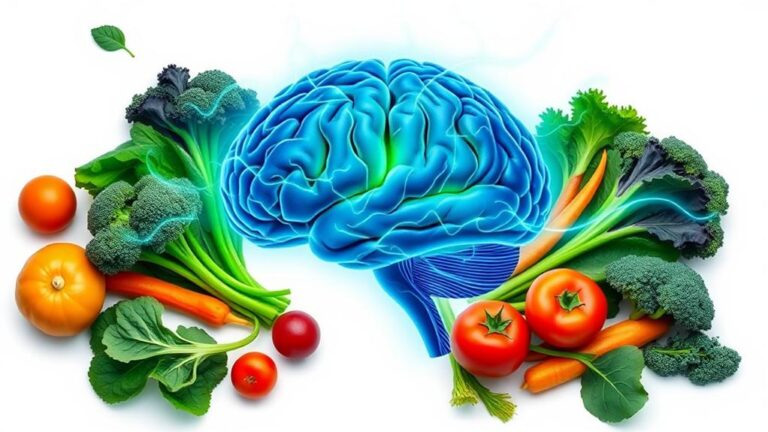If you're looking to enhance your mental clarity, reducing your carbohydrate intake might be a strategic move. By shifting your brain's energy source from glucose to ketones, you could stabilize your blood sugar levels and eliminate those frustrating energy crashes. This shift not only sharpens focus but also supports better memory and critical thinking. However, the benefits of a low-carb diet extend beyond just immediate improvements. What you might discover about the long-term effects on your cognitive function could change your approach to daily challenges.
Understanding Mental Clarity
When it comes to mental clarity, understanding what factors contribute to it's essential. Mental clarity refers to the ability to think clearly, make decisions efficiently, and maintain focus. Several factors can influence your mental clarity, including nutrition, sleep, and stress levels.
Nutrition plays a significant role in how well your brain functions. The foods you consume directly impact your energy levels and cognitive abilities. For instance, a balanced diet rich in whole foods can enhance your focus and memory. Some individuals have found that following a low-carb diet can lead to improved mental clarity and energy levels.
Sleep is another important component; without adequate rest, your brain struggles to operate at its best. Quality sleep helps consolidate memories and improves problem-solving skills.
Stress, on the other hand, can cloud your judgment and hinder your ability to think clearly. High stress levels can lead to anxiety, making it difficult to concentrate.
To improve your mental clarity, you need to manage stress through techniques like mindfulness, exercise, or deep breathing.
The Science Behind Low Carb
Exploring the science behind low-carb diets reveals how they can influence brain function and mental clarity. When you reduce carbohydrate intake, your body shifts from using glucose as its primary energy source to utilizing ketones, which are produced from fat. This metabolic switch can provide a more stable energy supply for your brain, minimizing the spikes and crashes associated with high-carb diets.
Ketogenic diets, which are extremely low in carbohydrates, can induce a state of ketosis that may offer additional cognitive benefits. Research shows that ketones can enhance brain function by improving mitochondrial efficiency, which is essential for energy production. Additionally, low-carb diets often lead to reduced inflammation, a factor linked to cognitive decline.
When you cut back on carbs, you may also experience improved blood sugar regulation, which plays a significant role in maintaining cognitive performance. Moreover, low-carb diets can help regulate neurotransmitters like serotonin and dopamine, contributing to better mood and mental focus.
As your brain adapts to using fat for fuel, you might find that your overall mental clarity improves, allowing you to think more clearly and concentrate better on tasks.
In short, the science supports the notion that reducing carbs can profoundly impact your brain health and cognitive function.
Immediate Effects on Focus
As you reduce your carb intake, you might notice an immediate boost in your focus and concentration. This change often stems from stabilizing your blood sugar levels. When you cut back on carbs, your body adapts by using fat as a primary energy source, which can lead to clearer thinking and enhanced mental agility. This process, known as ketosis, can greatly impact your cognitive function.
Many individuals report experiencing increased energy levels and improved mental clarity as their bodies shift to burning fat for fuel. You may find that tasks requiring deep concentration become easier to tackle. Instead of experiencing the usual post-lunch slump, you'll likely feel more alert and engaged.
Many people report an increased ability to prioritize tasks and maintain attention for longer periods. This newfound clarity can be particularly beneficial when you're faced with complex problems or creative projects.
Additionally, you might notice improved memory recall and a sharper ability to process information. The fog that sometimes clouds your mind can lift, allowing you to think more critically and creatively.
As your brain adjusts to this new fuel source, you may also experience enhanced motivation, helping you push through challenging tasks with greater ease.
Long-Term Cognitive Benefits
The benefits of reducing carbohydrate intake extend beyond immediate focus and concentration, paving the way for long-term cognitive enhancements. When you cut back on carbs, your brain shifts to using ketones as a primary energy source. This change can lead to improved brain function over time, as ketones are more efficient than glucose. You might notice enhanced memory retention and sharper problem-solving skills as your brain adapts to this new fuel.
Additionally, lower carbohydrate consumption can help stabilize blood sugar levels, reducing the risk of cognitive decline associated with spikes and crashes. A more stable energy supply means less brain fog and fatigue in the long run. Research suggests that diets lower in carbs can also support neurogenesis, the process of creating new neurons, which is essential for maintaining cognitive health as you age.
Moreover, reducing carbs can positively influence mood and emotional stability. By minimizing sugar intake, you may experience fewer mood swings and better overall mental resilience.
These combined benefits can't only enhance your daily cognitive performance but also safeguard your brain health for the future, allowing you to thrive mentally for years to come.
Tips for Reducing Carbs
Reducing carbs doesn't have to be intimidating, and there are simple strategies you can adopt to make the change smoother. Start by gradually cutting back on high-carb foods like bread, pasta, and sugary snacks. Instead, fill your plate with non-starchy vegetables, lean proteins, and healthy fats. This way, you'll feel satisfied without the excess carbs.
Next, read labels and be mindful of hidden sugars in sauces, dressings, and packaged foods. Opt for whole, unprocessed foods whenever possible. Planning your meals ahead of time can also help you avoid reaching for carb-heavy options in moments of hunger.
Experiment with low-carb alternatives, like cauliflower rice or zucchini noodles, to replace traditional grains and pasta. These swaps can make meals more enjoyable while keeping carb counts low.
It's also helpful to stay hydrated; sometimes thirst can masquerade as hunger. Keep a water bottle nearby to encourage drinking throughout the day.
Conclusion
As you commence your journey to enhance mental clarity through carb reduction, imagine your mind as a well-tuned engine, running smoothly on ketones instead of the erratic sputter of glucose. Embrace this shift, and you'll find your focus sharpening, your thoughts clearer, and your emotional stability blossoming like a flower in spring. With each low-carb meal, you're not just fueling your body; you're revealing a sharper, more resilient version of yourself ready to tackle life's complexities.



